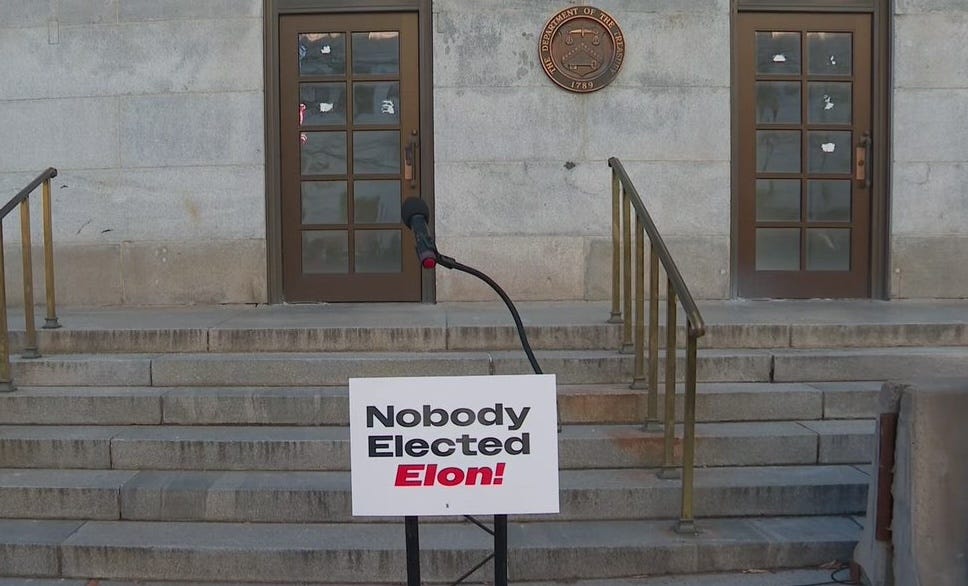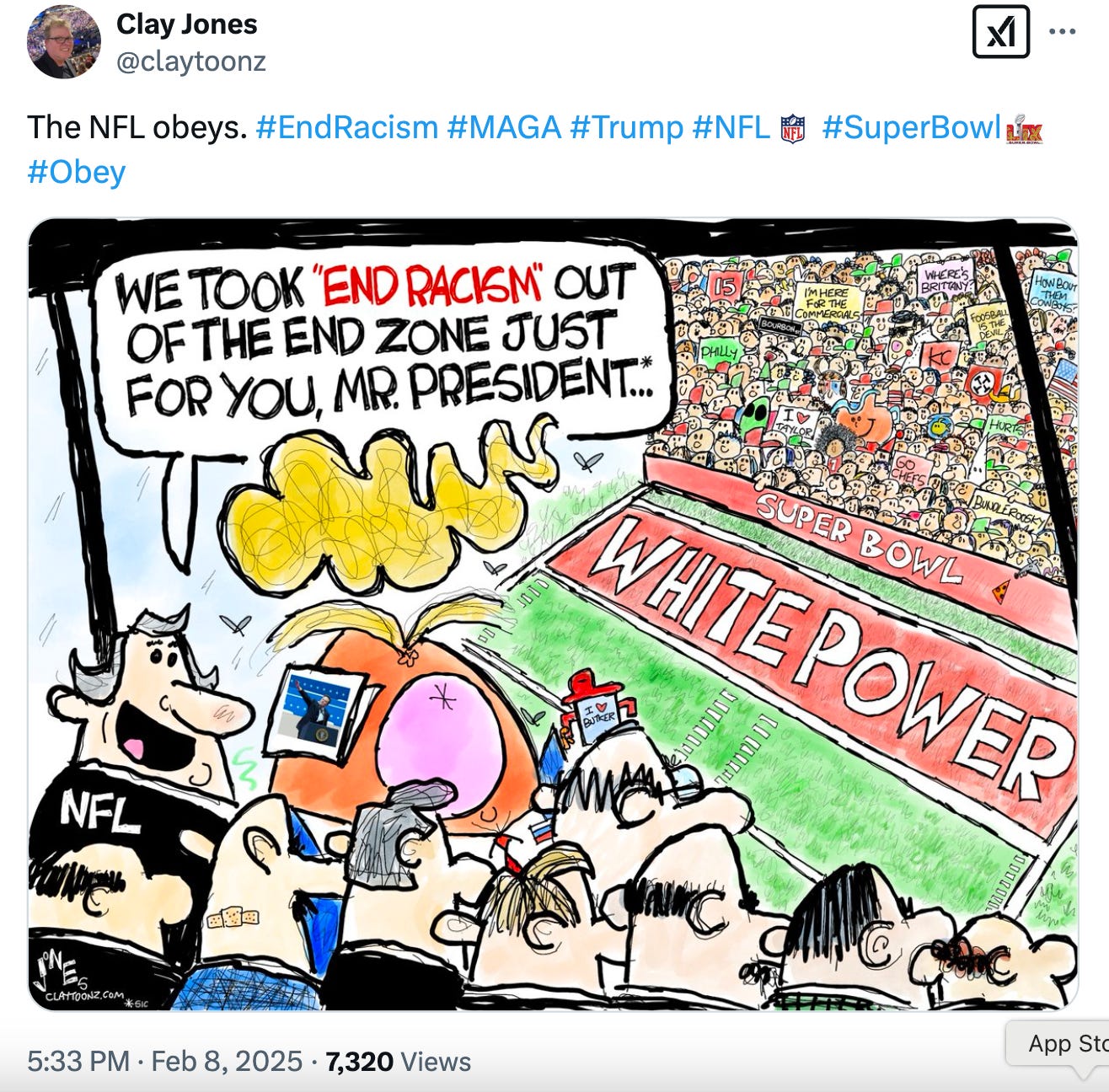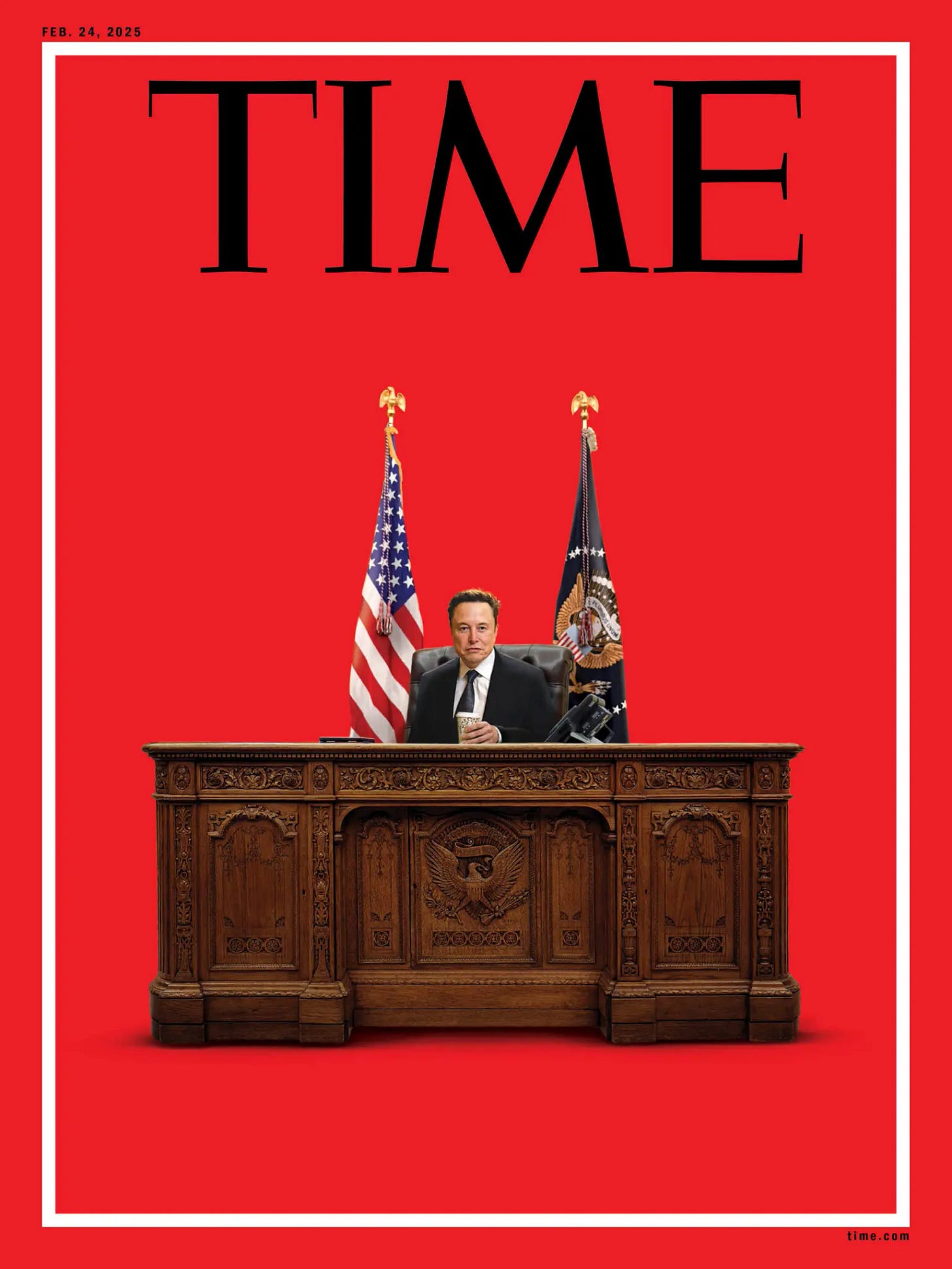Tipping Points
Another chaotic, whiplash week, rounded off by a trip to the Super Bowl.

A hundred and ten years ago this weekend saw the release of DW Griffith’s epic and still controversial motion picture The Birth of a Nation; three hours of racist propaganda which remains a landmark moment in the history of American cinema.
In March 1915 – fifty years after the end of the Civil War – it would become the first film to be shown inside the White House, when President Woodrow Wilson screened it for members of his cabinet, reportedly calling it "history written in lightning."
Ten years after that, the Ku Klux Klan held its biggest-ever rally on the streets of the capital, as US Marines guarded government buildings. While the 1920s have come to be seen as the “high” point in society’s normalisation of the KKK – they even had a baseball team, for goodness sake – how tipping points in the nation’s history become remembered and retold over time are soaked in symbolism, something all American politicians, including the current President, know well.
As William Faulkner famously said, “The past is never dead. It’s not even past.”
In a good piece in this week’s Atlantic, Eliot Cohen argues that rather than looking for historical analogies elsewhere, only by understanding America’s story can we make sense of our current moment.
”Trump and Trumpism, the servility of the Republican Party, and the flight from a values-informed foreign policy are all thoroughly American phenomena, and need to be understood in that way. History can help us see not so much where we are going as how we got here, and the nature and magnitude of the political challenges we face. …
“How did the presidency end up with such excessive powers vis-à-vis Congress and the judiciary? Why have so many Americans come to mistrust the government’s expertise and its ability to serve them well? What led them to put in office for a second time an odious and erratic felon? The answers will not be found merely in excoriating one administration or two. These problems have been long in gestation, and only by acknowledging that can we reckon with them.”
*
Lift Every Voice And Sing
Tonight, Donald Trump will become the first sitting President to attend a Super Bowl. His personal history with football – and with the NFL as an organisation – has been consistently confrontational and Trump will doubtless enjoy using this evening in New Orleans to rub some salt in an open sore. But the League, for its part, seems to have already rolled over.

Dave Zirin writes at The Nation that Trump’s presence at the game is “an affront to every NFL player”.
“It was Trump during the 2016 campaign, in an on-the-nose preview of what was to come, who said he wanted 49ers quarterback Colin Kaepernick to be kicked out of the country for taking a knee during the national anthem to protest police violence. In 2017, Trump infamously called all protesting players “sons of bitches,” and whined that they should be fired. In response to his abusive rant, the entire league stood together the following Sunday and knelt in protest. There was so much boiling rage among players that even franchise owners — many of whom are major bankrollers of Trump — joined the protest…
“Trump never played football. But he loves the sport as long as Black athletes are seen and not heard and they do as much physical damage to each other as possible. This is what sports were like in the 19th century, a place Trump seems determined to drag us to.”
At least the President should be in his seat ahead of the game in time to watch the $2m recruitment spot for the Secret Service, directed by Michael Bay. Because of course it is.
*
Forks In The Road
It has been another chaotic, whiplash week of Presidential bluster, shocking foreign policy statements, a further blitz of constitutionally doubtful executive orders, de-funding federal agencies, revocation of security clearances, as well as a trade war that isn’t, yet.
Even Steve Bannon told Semafor that “flooding the zone” had worked, and that the “media is in complete and total meltdown.”
But as Democrats begin to ramp up their pushback, there has been a series of legal challenges which may or may not realistically act as a check before things end up at the Supreme Court.
The Washington Post reported that, amid the chaotic Washington blitz, Elon Musk’s “ultimate goal” was revealing itself. (Spoiler, it’s replacing human workers with machines…)
“If Musk is successful, the federal workforce will be cut by at least 10 percent. A mass bid for voluntary resignations — blocked by a federal judge in Massachusetts who has scheduled a Monday hearing — is expected to be the first step before mass involuntary dismissals. Those are likely to include new hires or people with poor performance reviews, according to a plan laid out in memos issued over the last week by the Office of Personnel Management, which is now under Musk’s control. Unions this week advised workers to download their performance reviews and personnel files in preparation for having the information used against them.”
The DOJ under Pam Bondi disbanded its teams targeting kleptocrats, investigating corruption and election interference – under the guise of “refocusing” resources on combating drug cartels, while there have apparently been “discussions” about Marco Rubio taking control of the National Archives.
And, honestly, who knows how seriously we should take this…?
The President also decided this week that he would personally take over the Kennedy Center and get rid of its existing board members, including the chairman, Baltimore Orioles owner David Rubenstein.
Ben Rhodes writes in the New York Times that this “isn’t the Donald Trump America elected” but, really, it feels like that might be wishful thinking.
“Today we are a declining superpower grasping for lost status. The blend of grievance, nationalism and libertarianism that forms the basis of the partnership between Mr. Trump and Mr. Musk points to a future in which presidents are freed from guardrails around the use of power and from the inconvenience of a federal work force that may chafe at participating in abuses of power. And while there is an absurdity to some of Mr. Trump’s comments, the history of the first half of the 20th century reminds us what happens when a strain of nationalism emerges, unbridled by rules, institutions or aspirational values. Large nations led by nationalist strongmen inevitably clash; people inevitably suffer.”
Particularly if those opposed to the President are pinning their hopes of a rift between him and his primary donor over something as relatively insignificant as a magazine cover.
So no, nobody elected Elon. And this may or may not be the Donald Trump people thought they were voting for. But we can’t overlook the fact that 90 million eligible Americans didn’t vote at all in the 2024 election – more than voted for either of the two major party candidates.
The end result so far has hardly been a surprise. Jason Kravits tried to warn us, after all.
*
Marking the changes
Fay Vincent, who was Commissioner of Baseball from 1989 to 1992, died this week aged 86.
George Vecsey’s NYT obit describes how Vincent navigated a period of labor strife, the emergence of steroid use, the banning of Pete Rose and an earthquake that rattled a World Series.
Tyler Kepner writes:
“Vincent was 54 years old when he resigned and spent his remaining years serving on various boards — he was a trustee at Williams College, chairman of the board at Hotchkiss and a senior director on the board at Time Warner. He was president of the New England College Baseball League and wrote on sports, business and history for various publications, notably the Wall Street Journal.
“He also interviewed nearly 60 retired players for an oral history project available at the Hall of Fame’s library. It led to three books: “The Only Game in Town” (2006), “We Would Have Played For Nothing” (2009) and “It’s What’s Inside That Counts” (2010).
“Among the interviewees are Negro League players, who received a formal apology from Vincent, on behalf of MLB, in a ceremony in Cooperstown in 1991. The long-overdue gesture included health insurance for the players and their wives, and in 2024 Vincent called it his greatest source of pride.”
The current Commissioner, Rob Manfred, recently marked ten years in the job – the fifth of Baseball’s ten Commissioners to reach that point – and reflected on how the game has changed during his tenure. Manfred also said MLB’s commitment to its “values on diversity remains unchanged”.
Manfred announced this week that Pat Hoberg, considered one of baseball’s best umpires, had been fired over an association with a known gambler. Hoberg is the first umpire to be fired for violating MLB’s gambling policy.
Meanwhile, Ippei Mizuhara, Shohei Ohtani’s former interpreter, was sentenced to 57 months in prison and ordered to pay nearly $17M in restitution to the Dodgers pitcher.
***
Finally, thank you and welcome to anyone who has recently subscribed. I really appreciate your interest in the project. You can find out a bit more about it all here:
I’m very happy to have you along as I figure out how best to restart these conversations and get a sense of how people feel about the country. Thanks for reading and see you next week.
Some Recent Posts You Might Enjoy:
The Buck Stops Somewhere Else, Feb 2 - The new administration’s initial handling of the Potomac air crash was shocking. It was only the start.
Government By Kayfabe, Nov 21 – Echoes of Pro Wrestling resonate around how Donald Trump won the Presidency.
Fathers Playing Catch With Sons, Dec 5 – Well, what would you do?
*




